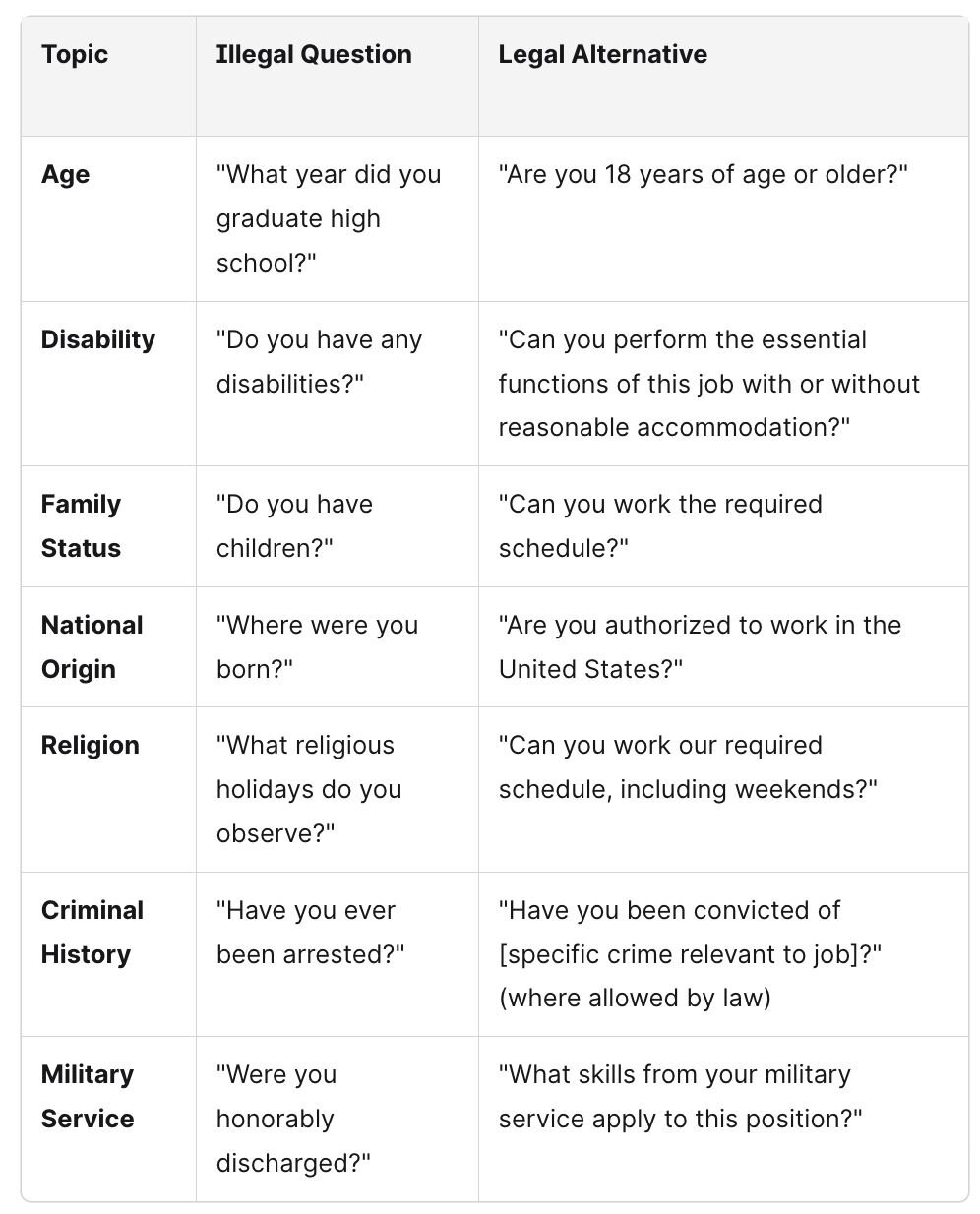Job application templates make it easy for businesses to collect information from candidates for open roles at the company. The templates include fields for contact information, previous employment, references, and other common details.
While you can use them as is, customizing your job application templates can help you get the information you need for each role you’re hiring for.

What is a job application template?
A job application template is a standardized form that employers use to collect consistent information from job applicants, including contact details, work history, education, and references.
Using a template makes the hiring process fair, efficient, and compliant with employment laws.
These templates have become essential tools for small businesses and human resource (HR) professionals who need to streamline their recruitment while still gathering all necessary information in a way that protects applicants’ rights and keeps the business compliant with the law.
Why use a job application template?
A well-designed job application template serves as the foundation for fair and efficient recruitment. It helps businesses:
- Standardize the information they collect
- Improves the applicant review process
- Save time when reviewing applications
- Reduce the risk of potential discrimination claims
Templates are designed to be customizable based on the position you’re hiring for, the concerns your business has, and the requirements for the industry. But they also help you avoid asking for information that you’re not legally entitled to ask for.
Benefits for small businesses and HR teams
Small businesses and HR teams gain significant advantages from using job application templates. These forms create a paper trail for compliance purposes, streamline the screening process by organizing information consistently, and reduce the time spent collecting basic candidate details.
Templates also help inexperienced hiring managers ask appropriate questions while avoiding potentially discriminatory inquiries. Additionally, having all candidate information in a standardized format makes it easier to maintain organized records and respond to any employment verification requests in the future.
Benefits for job seekers
Job seekers also benefit from standardized application forms. These templates provide clear expectations about what information employers need, helping candidates prepare comprehensive responses. The structured format ensures applicants don't accidentally omit important details that could strengthen their candidacy. Furthermore, standardized applications level the playing field by giving all candidates equal opportunity to present their qualifications, regardless of their resume design skills or access to professional resume services.
How is a job application template different from a résumé?
A job application template is usually an employer-created standardized form that collects specific information from all candidates in a consistent format. A résumé is a candidate-created document that highlights their best skills and showcases their responsibilities at previous employers. Resumes can give employers insight into a candidate’s abilities and can help verify the information the candidate enters on the job application.
Applications typically require more detailed information, including complete employment history with no gaps, specific salary information, references with contact details, and legal disclosures or certifications.
Essential sections of a job application template
A comprehensive job application template must include several key sections to gather all necessary information while maintaining legal compliance. Each section serves a specific purpose in the evaluation process and helps create a complete picture of the candidate's qualifications and suitability for the position.
Understanding what to include and why ensures your application form meets both your hiring needs and legal requirements.
Personal information
The personal information section forms the foundation of any job application. Include fields for the applicant's full legal name, current address, phone number, and email address. It’s also standard to include a field for preferred pronouns and an optional field for a LinkedIn profile or professional website.
Avoid asking for information that could lead to discrimination, such as date of birth (beyond confirming the applicant is 18 or older), marital status, or Social Security number (which should only be collected after a job offer is made).
Position and availability
This section clarifies the specific role the candidate seeks and their availability to work. Include fields for the position title, desired salary or hourly rate, employment type preference (full-time, part-time, or temporary), and available start date.
Add questions about willingness to work overtime, travel requirements, and shift preferences if relevant to the position. Also include a question about how the applicant learned about the position, which helps track your recruitment efforts.
You may also want to include questions about an applicant’s ability to come into the office if you’re hiring for a hybrid position. If you’re hiring for a remote role, consider including a note about the remote status and any travel expectations associated with the role.
Work eligibility
Federal law requires employers to verify that all employees are legally authorized to work in the United States. Include a simple yes/no question asking, "Are you legally authorized to work in the United States?" followed by a note that proof of work authorization will be required upon hire. Avoid asking about citizenship status, visa type, or nationality, as these questions could constitute discrimination. Simply confirming work authorization is sufficient at the application stage.
Education
The education section should capture relevant academic credentials while remaining inclusive of various educational paths. Include fields for high school, college, and post-graduate education, with spaces for institution names, locations, degrees or certificates earned, and graduation status or expected graduation dates.
Consider adding fields for relevant certifications, professional development courses, or vocational training. Make sections optional where appropriate, as not all positions require specific educational credentials.
Employment history
A detailed employment history helps verify the candidate's experience and identify relevant skills. Request information for at least the past 10 years or the last three positions, whichever is less. For each position, include fields for employer name, address, phone number, supervisor name, job title, employment dates, starting and ending salary, primary responsibilities, and reason for leaving.
Consider adding a checkbox asking if you may contact each employer, as some candidates may not want their current employer contacted.
References
Professional references provide valuable third-party perspectives on a candidate's work performance and character. Request at least three professional references, specifying that they should not be relatives. For each reference, include fields for name, title, company, relationship to applicant, phone number, and email address. Some employers also include a field asking how long the reference has known the applicant and in what capacity.
Additional questions and disclosures
This final section addresses specific job requirements and legal disclosures. Include relevant questions about physical requirements (using legally compliant language), professional licenses or certifications, willingness to undergo background checks or drug testing, and any potential conflicts of interest.
Add a statement about equal employment opportunity and any required legal disclosures. End with a signature line and date field, along with a statement that false information may result in termination.
How to customize and use your job application template
Customizing a job application template for your specific business needs requires careful consideration of both your hiring requirements and legal compliance obligations. The process involves more than simply adding your company logo—it requires thoughtful adaptation to reflect your company culture, specific position requirements, and industry standards while maintaining legal compliance. Taking time to properly customize your template ensures it serves as an effective screening tool while protecting your business from potential legal issues.
Step 1: Download your chosen format
Begin by selecting the format that best suits your needs from our downloadable templates above. Consider your technical capabilities, how candidates will submit applications, and your team's preferred review method. Download the template and save it to a secure location where your HR team can access it. Create a master copy that remains unedited as your baseline template.
Step 2: Add business name and logo
Open your downloaded template and replace the placeholder business name with your company's legal name throughout the document. Add your company logo to the header, ensuring it's properly sized and doesn't interfere with the form's readability. Include your business address, phone number, and website in the header or footer. If you have multiple locations, consider creating versions for each location or adding a field for applicants to select their preferred location.
Step 3: Modify sections and questions as needed
Review each section carefully and modify questions to align with your specific hiring needs. Remove sections that aren't relevant to your positions (for example, commercial driver’s license information for office jobs or professional certifications for retail positions) and add industry-specific requirements. When adding new questions, ensure they directly relate to job performance and don't venture into protected class territories.
Consider creating different versions for different position types. For example, your application for warehouse positions might emphasize physical capabilities, while office positions might focus more on technical skills.
You’ll also want to specify if the position is for an employee or a contractor, and if the position will require full-time or part-time hours.
Step 4: Add disclaimers and consent sections
Include necessary legal disclaimers at the end of your application. Add an at-will employment statement if applicable in your state, Equal Employment Opportunity statement, and authorization for background checks if you conduct them. Include a consent statement for contacting references and previous employers.
Add a certification statement where applicants affirm that all information provided is accurate and understand that false information may result in termination. Consult with legal counsel to ensure all required disclosures for your jurisdiction are included.
Step 5: Save, print, or upload digitally
Save your customized template in multiple formats to accommodate different distribution methods. Create a print-friendly version for in-person applicants and a fillable digital version for online submissions.
If using an applicant tracking system (ATS), ensure your template is compatible with the system's requirements. Test the form thoroughly before distribution—have someone complete it to identify any issues with formatting, unclear questions, or technical problems with fillable fields.
Step 6: Store completed forms securely
Establish a secure system for storing completed applications, as they contain sensitive personal information. Digital applications should be stored in password-protected folders with limited access. Physical applications should be kept in locked filing cabinets.
Implement a retention policy that complies with federal and state requirements – typically, applications must be kept for at least one year, but some jurisdictions require longer retention periods. Once that time lapses, you can decide if you want to keep or shred the applications.
Legal and compliance considerations for job applications
Understanding and adhering to employment law is crucial when creating and using job application templates. In 2026, employers face increased scrutiny regarding fair hiring practices, data privacy, and Equal Employment Opportunity compliance. Federal laws, including Title VII of the Civil Rights Act, the Americans with Disabilities Act (ADA), and the Age Discrimination in Employment Act (ADEA), along with various state and local regulations, govern what you can and cannot ask on job applications.
Staying compliant protects your business from costly discrimination lawsuits while ensuring a fair hiring process for all candidates.
Which questions to avoid
The Equal Employment Opportunity Commission (EEOC) prohibits discrimination based on race, color, religion, sex (including pregnancy, sexual orientation, and gender identity), national origin, age (40 or older), disability, or genetic information. Questions that directly or indirectly reveal information about these protected characteristics should be avoided.
This includes seemingly innocent questions that could reveal protected information, such as:
- Asking for graduation dates (which can indicate age)
- Requesting a photo (which reveals race and potentially other protected characteristics)
- Asking about medical conditions
- Asking about disabilities
- Requesting information about an applicant’s marital status
This is far from an exhaustive list. The important thing to remember when creating or customizing your job application template is to focus exclusively on questions that directly relate to the candidate's ability to perform essential job functions.
State and local law variations
Employment law varies significantly by state and locality, with some jurisdictions providing additional protections beyond federal requirements. For example, many states now prohibit asking about salary history, while others have "ban the box" laws that restrict when you can ask about criminal history.
Some cities have added protections for characteristics like hairstyles, weight, or political affiliation.
It’s essential to research the specific requirements in every jurisdiction where you hire. Consider consulting with local employment law attorneys to ensure compliance with all applicable regulations.
Legal vs. illegal sample questions
Understanding the difference between legal and illegal questions helps protect your business while gathering necessary information.
| Topic | Illegal Question | Legal Alternative |
|---|---|---|
| Age | "What year did you graduate high school?" | "Are you 18 years of age or older?" |
| Disability | "Do you have any disabilities?" | "Can you perform the essential functions of this job with or without reasonable accommodation?" |
| Family status | "Do you have children?" | "Can you work the required schedule?" |
| National origin | "Where were you born?" | "Are you authorized to work in the United States?" |
| Religion | "What religious holidays do you observe?" | "Can you work our required schedule, including weekends?" |
| Criminal history | "Have you ever been arrested?" | "Have you been convicted of [specific crime relevant to job]?" (where allowed by law) |
| Military service | "Were you honorably discharged?" | "What skills from your military service apply to this position?" |

Importance of privacy and data protection
Data privacy regulations have become increasingly stringent, requiring employers to carefully handle applicant information. Include a privacy notice explaining how you'll use, store, and protect applicant data.
Implement secure storage systems for both digital and physical applications. Limit access to application data to only those involved in hiring decisions. If using third-party services for background checks or application processing, ensure they comply with data protection regulations.
When possible, only collect information you actually need for the hiring decision.
When to consult an employment law expert
While templates provide a solid foundation, certain situations require professional legal guidance. It may be worth consulting with an employment law attorney when creating applications for the first time, expanding into new states or jurisdictions, implementing new screening procedures like background checks or drug testing, or after receiving discrimination complaints about your hiring process. They’ll be able to review your applications and make sure they’re compliant with the law.
Additionally, seek legal counsel when hiring for positions with special requirements (such as government contracts) or when updating applications to reflect law changes. Regular annual or bi-annual legal review of your hiring practices helps ensure ongoing compliance as laws evolve.
How LegalZoom can help businesses get ready to hire
Starting a new business is exciting, but setting your organization up for long-term success requires a bit of legwork at the beginning. LegalZoom can help you establish an LLC to protect yourself from personal liability or create a business name to operate under so your company looks more professional.
Job application template FAQs
Do employers still use paper applications?
Yes, many employers still use paper applications, particularly in industries like retail, hospitality, and manufacturing, where candidates may apply in person. Paper applications remain valuable for walk-in applicants, job fairs, and positions that don't require computer skills.
However, most employers now offer both paper and digital options to accommodate different candidate preferences and improve accessibility.
What is the best format for a job application template?
The best format depends on your specific needs and technical capabilities. PDF formats work well for maintaining consistent formatting and professional appearance across all devices. Word documents offer the most flexibility for customization, but may display differently on various devices. Google Docs provides excellent collaboration features and accessibility without software requirements.
Can I use the same template for all positions?
While a general template can serve as your foundation, customizing applications for different position types improves their effectiveness. Entry-level positions may require less detailed employment history, while executive roles might need additional sections for leadership experience or board service. Technical positions benefit from skills checklists specific to required competencies.
Consider creating a master template with core sections. Then develop position-specific versions that add relevant questions while removing unnecessary sections to customize the template for the role.
Are digital signatures legally valid on job applications?
Yes, digital signatures are legally valid on job applications under the Electronic Signatures in Global and National Commerce Act (E-SIGN Act) and the Uniform Electronic Transactions Act (UETA).
Is it necessary to ask for references on the form?
While not legally required, requesting references on the application form streamlines your hiring process and demonstrates thoroughness. References provide valuable third-party perspectives on candidates' work performance and character. However, you may want to consider making the reference section optional for initial applications, especially for entry-level positions where candidates may have limited professional references. You can always request references later in the process for serious candidates.
Diane Faulkner contributed to this article.


